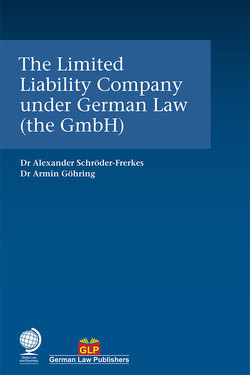Читать книгу The Limited Liability Company under German Law (the GmbH) - Dr Alexander Schröder-Frerkes - Страница 8
На сайте Литреса книга снята с продажи.
ОглавлениеIII. Acquisition of a shelf company
35. Requirements
Apart from establishing a company ‘from scratch’, another possible way of becoming a shareholder in a GmbH is by means of the acquisition of a previously founded shelf company. This is a popular method of obtaining a fully established and registered GmbH which is ready to operate. In order to acquire shares in the GmbH, a notarised share purchase and transfer agreement is required.1 As well as acquiring the shares in the GmbH, the managing directors of the shelf company must be replaced by new managing directors, and the articles of association must be adapted to the requirements of the acquiring party. The corresponding shareholder resolutions to be passed are usually included within the same notarial deed which pertains to the acquisition of the shares.
36. Formal requirements and liability
On 9 December 2002, the German Federal Supreme Court (Bundesgerichtshof) ruled that the acquisition of a shelf company is to be considered (in economic terms) as a new foundation, and thus that the rules pertaining to the formation of a GmbH apply accordingly.2 This means, in particular, that at the point in time at which the amendments to the articles of association or the notification regarding the new managing director(s) are filed for registration with the commercial register, the managing directors must confirm that the stated share capital has been fully contributed and (remains) at their free disposal (for further details see Sections 157–160). They must also declare that they are not prohibited from practising certain professions associated with the business purpose of the company and that they have not been sentenced in connection with certain specific criminal offences (for details see Section 32). In other words, at the point in time at which the shelf company is activated and (re-)commences its business activities, it is treated like a newly founded company and, in particular, the share capital must still be present in full. It is therefore advisable that the shelf company to be acquired has not yet participated in or commenced any business activities prior to its acquisition and prior to the filing of the changes with regard to the articles of association and of the managing director(s). In a more recent decision,3 the German Federal Supreme Court ruled that specific acts relating to the planning and preparation for commencing the business are in themselves sufficient to be considered ‘business activities’, thus depriving the company of its status as a shelf-company. If a company has forfeited its status as a shelf company in this way, the privileges accorded to new formation in economic terms as outlined in this chapter will not apply. The acquisition of such a GmbH would in this case not be considered equal to the (original) foundation of a GmbH.
Furthermore, besides confirming that the stated share capital remains present in full, the managing directors of a shelf company are obliged to explicitly disclose to the court maintaining the respective commercial register that the activation of the shelf company is a new formation of the company in economic terms (wirtschaftliche Neugründung).4 By these means, the court maintaining the register is able to verify whether the stated share capital is still fully available. If there is a failure to disclose the wirtschaftliche Neugründung and to declare that the full stated share capital remains available, the shareholders may be held personally and unlimitedly liable for all obligations of the company (Unterbilanzhaftung). The details surrounding this liability have proved to be an issue of dispute amongst academics in the field and the courts. In a recent decision, the Federal Supreme Court ruled that the liability of the shareholders is limited to the difference between the statutory share capital and the actual value of the assets of the company (excluding the costs connected with its foundation which are borne by the company).5 According to the Federal Supreme Court, this even applies if the wirtschaftliche Neugründung is not disclosed to the court maintaining the respective commercial register. However, in practice, it continues to be advisable to undertake the disclosure as outlined to facilitate the registration of changes to the articles of association of the company during the acquisition process. The burden of proof as regards the non-existence of a difference of this nature lies with the shareholders. The Federal Supreme Court ruled that the decisive point in time with regard to proving that the statutory share capital continues to be held by the company is the point in time at which the company files the amendments to its articles for registration or commences its business operations. In particular, it is unclear whether the evidence provided by the shareholders to the effect that the stated share capital was actually available in full when the wirtschaftliche Neugründung was registered, or a later disclosure of the existence of a wirtschaftliche Neugründung, will release them from personal liability.
1Gesetz betreffend die Gesellschaft mit beschränkter Haftung (GmbHG) (Act on Limited Liability Companies) 1892, s15, para. 3 (FRG).
29 December 2002, Bundesgerichtshof (German Federal Supreme Court) (II ZB 12/02) – BGHZ 153, 158; confirmed, eg, by decision of 18 January 2010; Bundesgerichtshof (German Federal Supreme Court) (II ZR 61/09).
318 January 2010, Bundesgerichtshof (German Federal Supreme Court) (II ZR 61/09).
4See, eg, 11 March 2010, Oberlandesgericht München (Munich Court of Appeal) (23 U 2814/09).
56 March 2012, Bundesgerichtshof (German Federal Supreme Court) (II ZR 56/10).
